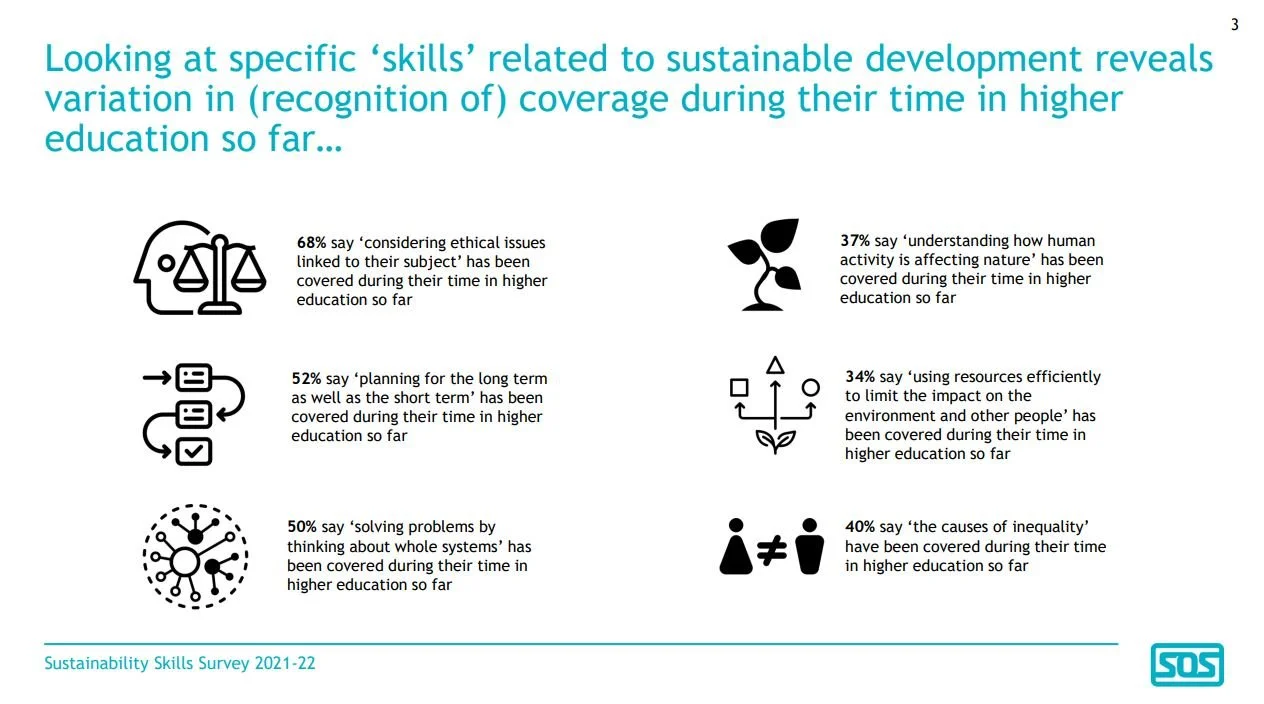Survey takers say ‘it is important to prepare young people for environmental issues in schools’.
After recent surveys conducted by NUS, SOS (Students organising for sustainability), new statistics surrounding young people and sustainability have come to light. SOS ‘carry out specialist research into sustainability and social responsibility focused on the education sector in the UK and internationally’, and we’re going to be using their research and statistics for this news article today.
One survey, titled ‘Perspectives on young people, education and environmental issues’, explores children and young people, and their views on education on various environmental issues. This survey was completed by over 2000 respondents, with the following results:
76% of respondents think it is important to prepare children and young people for climate change at school
74% of respondents think it is important for governments, businesses and community organisations to develop opportunities for young people to tackle environmental issues
23% of respondents report understanding more about environmental issues as a result of children and young people they know learning about them at school
After seeing an outside view of students and sustainability (the survey respondents above were mostly over 55), we wanted to take a look at an inside view, as an actual student. We found another survey, titled: ‘Sustainability Skills Survey’. In this survey, University students were asked questions surrounding teaching sustainability in an educational setting. Here are some of the results:
According to the survey, two thirds of students in the UK want to learn MORE about sustainability.
The Universities included in these statistics are: University of Brighton, Courtauld Institute of Art, Newcastle University, University of Sheffield, University of Bristol, Leeds City College, Manchester Metropolitan University, Nottingham Trent University, University of Greenwich, and Plymouth University.
This particular survey has ran every year since 2017, and over 6 years of surveys, student demand for sustainability has grown. This year, the growth has been bigger than previous years, with 80% of further education college respondents wanting their college to take sustainability seriously. This survey data sends a clear message that students in HE and FE care about sustainability. ‘They want to learn more about it, and that they want be a part of the solution to our unsustainable society’ says Rob Young, NUS Vice President.
We also took a look at another survey where younger people had their say. The survey titled: ‘Schools Sustainability Survey’, surveyed respondents from primary school, secondary school and sixth form.
With these statistics in mind, it is clear we should be teaching more sustainability topics in schools, from Primary School through to University. Not only is sustainability a ‘hot topic’ right now, it’s also an increasing worry for people of all ages, but particularly young people. Sustainability is about resource use and consumption; making better choices to reduce waste and preserve resources for future generations, so how do we teach this to our younger generations exactly? Here’s some ways we think schools should tackle sustainability:
Recycling - Teach children how to recycle properly, what is recyclable & what isn’t, set up recycling points, and even restrict use of plastics in the classroom.
Energy - Replace lights in the classroom, work towards shifting to outdoor solar classrooms, practice turning lights off when not in a room.
Climate change - Teach about animals that are affected by climate change, explore greenhouse effect, ask children for opinions and ideas to develop plans to reduce global warming,
Start at the school level and then ask them to take it home!
Start organic growing at the school, make a garden area, or greenhouse, and teach the importance of locally sourced foods.
Going paperless or using less paper/eco friendly paper, students may like using digital technology instead of paper too.
Make some arts and crafts surrounding the idea of sustainability, even add nature (leaf’s, twigs etc) into the drawings.
Make up green societies or panels amongst student bodies.
Organize seminars and training by inviting renowned environmentalists to school.
Organize field trips to parks and botanical gardens.
Take up initiatives like celebrating Earth hour, bike riding and walks for a cause, school clean-up day, etc.
Not only would these educational messages regarding sustainability help young people understand more, it will help the world become a better place. Learning about the climate can help children and young adults develop a sense of responsibility and critical thinking, as well as involving non-conventional teaching methods that could be fun to learn in the classroom.
We’d love to hear what you think, comment on this article and leave your thoughts below!
-Solutions 4 Plastic Team






